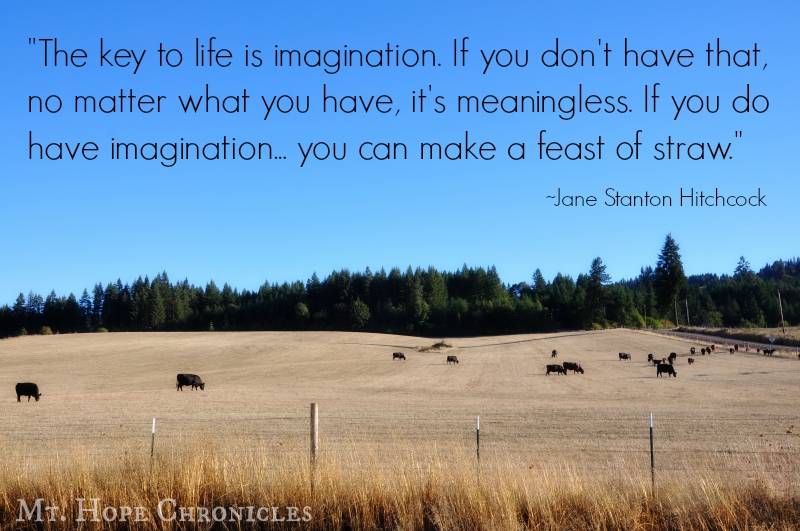
Life
:: On Praise and Criticism by Michael Clay Thompson @ Royal Fireworks Press
"It seems to me that praise is the difficult thing, the advanced thing, the thing that requires the most thought and courage. Criticism, by comparison, usually (not always) seems cheap to me, and much of our intellectual culture seems filled with cheap shots...The flaws are the low-hanging fruit. So you can always find things to criticize, and being negative seems socially safe. It has an element of cowardice in it. The crowd cannot call you a fool if you beat them to the ironies, and a satirical countenance is always superior. In the face of that, we must learn how to praise."
:: We Are Difficult People by Tresta @ Sharp Paynes
"All I can really say at this point is that people are difficult at every stage and our desire to complain about our restless baby, tantrum-throwing toddler, tormented teen, or even our aging and forgetful parents, is a desire to put ourselves in the middle of whatever it means to be grown-up."
:: Children Who Never Play by Michael J. Lewis @ First Things
"To teach them is a joy, but they will risk nothing, not even for one facetious question on a minor exam."
Literature
:: Housekeeping by Peter Leithart @ First Things
'“What are all these fragments for, if not to be knit up finally?” That question from Housekeeping haunts Robinson's other novels, and is a clue to the Robinson's depiction of “a longing for wholeness and repair that has no answer in this world.”'
:: Matters of Conscience – Reactions to Harper Lee’s Go Set A Watchman by Missy Andrews @ Center for Lit [Oh, how I adore this review of Go Set a Watchman!]
"To love a hero is the stuff of childhood. To love a man is the mark of maturity."
:: Fantasy and Faith by Sally Thomas @ First Things
'We have all encountered novels, poems, paintings, and music of sincere and unimpeachable sentiment that were nevertheless so bad they made our teeth hurt. What L’Engle intuited about art was a principle that Flannery O’Connor named: “The sorry religious novel comes about when the writer supposes that, because of his belief, he is somehow dispensed from the obligation to penetrate concrete reality . . . . But the real novelist, the one with an instinct for what he is about, knows that he cannot approach the infinite directly, that he must penetrate the natural human world as it is.”'
:: A Defense of the Grotesque in Flannery O’Connor’s Art @ The Imaginative Conservative
Hans Urs von Balthasar speaks of Christ as “the image that reveals the invisible God” (The Glory of the Lord, vol. 1, 32). Christ is therefore the greatest icon or image (even from eternity as the Word of God, but made accessible to us in the form of man in the Incarnation), through which we can contemplate reality. The highest expression of this image on earth, however, is grotesque. When we love Christ, we “have been inflamed by the most sublime of beauties—a beauty crowned with thorns and crucified” (ibid., 33). The ultimate meaning of human life and the deepest glimpse that we have into the eternal love of God comes to us on the Cross. This tells us something of the deep meaning of human suffering, in which we can catch a glimpse of this love, or at least an order toward it, even if unfulfilled.
Education
:: Good Writing vs. Great Teaching by Andrew Pudewa @ IEW
"Let us encourage children to experiment and play with words, remembering that what they do and how they learn is vastly more important than what they produce. Children who are free to play with words will fall in love with words; time, maturity, and life will help them balance creativity, eloquence, and conciseness. It is okay, in fact good, for children to be bold with words—even to an extreme. We don’t know what they will be called to do in life. One may become a technical writer or a playwright while another may become a novelist or journalist. Our job is not to decide what is “good” or “right” and chisel too early, but to feed, nurture, encourage and build up the child with the “stuff” of language and the joy of using it. Our work is to help form the linguistic marble from which they will create their profession or vocation; and others will help carve it away. For a sculptor, more marble is better than less."
:: Descartes Visits Chemistry Class And Is Asked to Leave by Marc Hayes @ CiRCE
The unique wonders of the human eye, of light, of time, and of color allowed us to see colors that we hadn’t drawn on the paper. Does that mean the ink was not there? Of course. Does that mean the beauty was not there? Of course not.
:: Rediscovering the Forgotten Benefits of Drawing @ Scientific American
"But knowledge isn’t enough; if it were, anyone graduating with a biology degree could recreate Audubon’s bird portraits or Leonardo’s anatomical figures. Observation skills are crucial. The abilities to see without bias and to focus on detail and pattern require training, not talent."
Podcasts:
:: Quiddity #55: Andrew Pudewa [CiRCE]
:: Quiddity #54: Jenny Rallens on Why (and How) Memory Cultivates Virtue
:: Melody, Mystery, and Mayhem
And a few interesting thoughts on the movie War Room:
:: Lazy Writing, Cheap Restoration by Kenneth Morefield @ Christianity Today
:: Genie Jesus and the War Room Problem by John Mark N. Reynolds @ Patheos
:: The Heresy of Christian Movies: War Room @ A Day in His Court

No comments:
Post a Comment